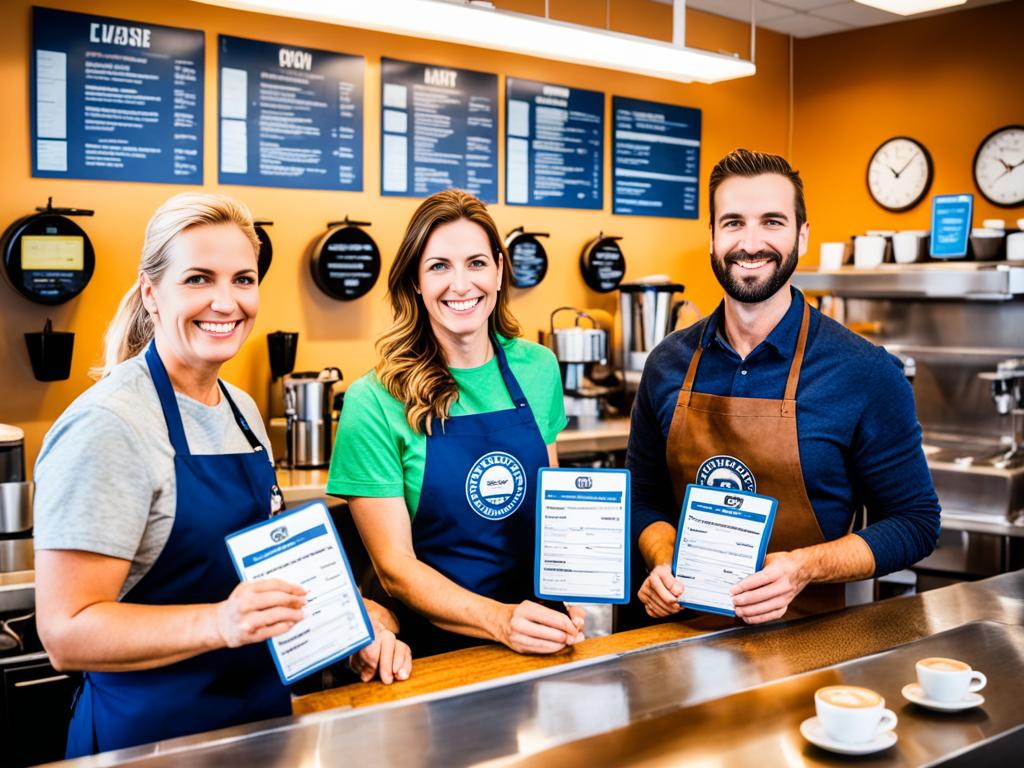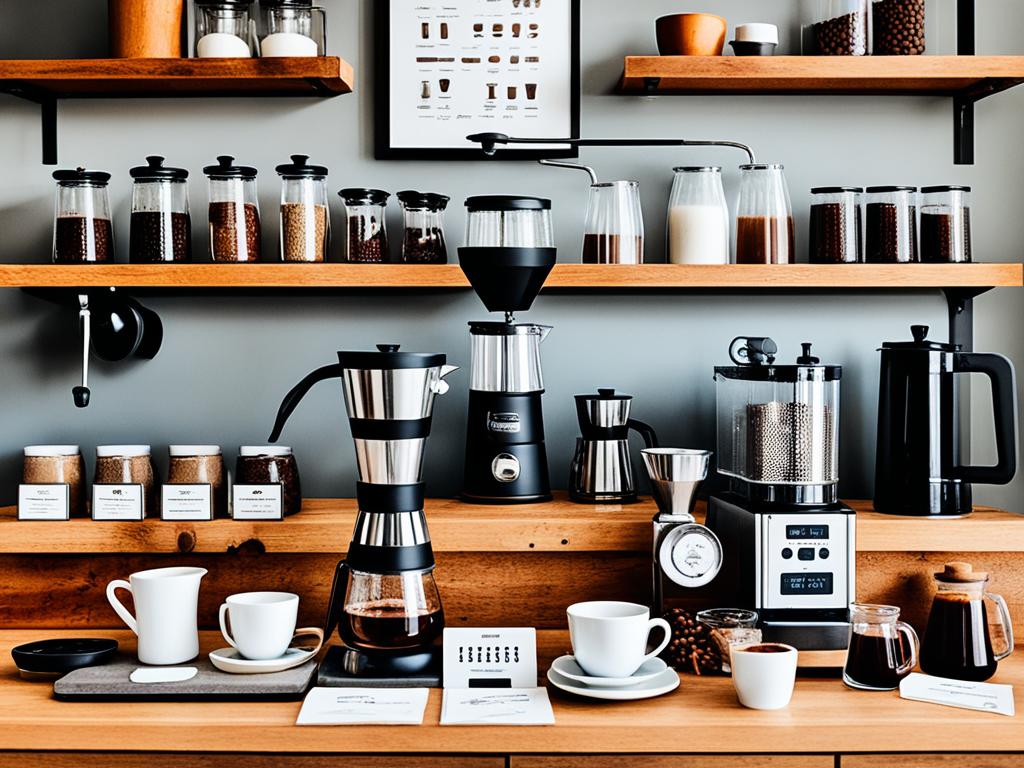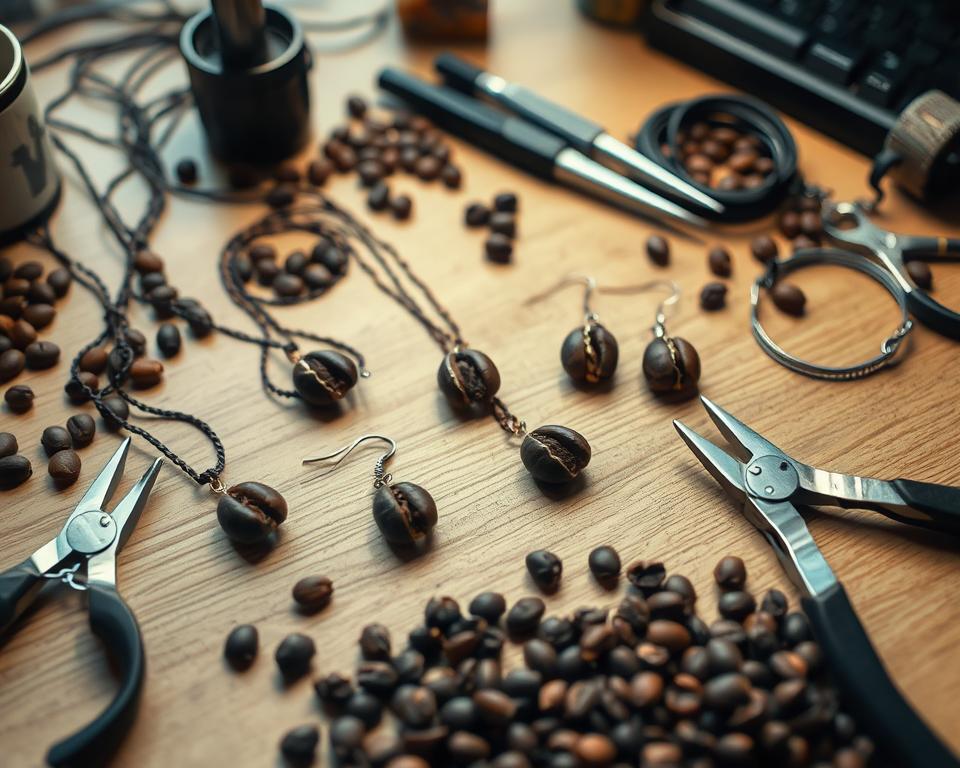Before starting, you need to understand the coffee shop license requirements. Did you know playing music in your shop needs special permissions? Or that health inspectors check each coffee you serve?
Getting your coffee shop off the ground means dealing with a lot of rules and paperwork.
But don’t let this scare you. I’ll help you see that, with the right preparation, these challenges can become opportunities.
If you’re truly committed to your coffee shop dream, following the rules is not just important; it’s necessary.
Key Takeaways
- Exploring the necessary permits and licenses is a vital step before making your coffee shop a reality.
- It’s not just about passion for coffee; legal compliance is a must for every café hopeful.
- Awareness of operating costs and ensuring they’re covered can shield your business until it becomes profitable.
- The right location and space can make a huge impact on the success of your coffee shop.
- Accurate budgeting is key, from securing top-notch espresso machines to staffing your team.
Understanding the Importance of Proper Licensing
Opening a new coffee shop is about more than making great coffee. It’s also about handling coffee business permits and licenses for coffee shops. Getting these permits and licenses right is key to running your shop smoothly.
For instance, permits for opening a coffee shop show your customers and community that you care about safety and quality.
Many entrepreneurs focus on the fun part of setting up their shop. Yet, paying attention to rules is what makes a business succeed. Securing the right licenses from the start protects your dream.
For example, documentation like the Employer Identification Number (EIN) for payroll or health and safety endorsements protects against legal issues.
Starting with the right procedures builds trust with your future customers. They’ll appreciate the great coffee and the peace of mind knowing your shop meets all standards. So, see this step as building the foundation for a strong business as well as great espresso.
Navigating Local and State Requirements for Coffee Shops
When I decided to open my coffee shop, I learned a lot quickly. I found out that knowing and following all the coffee shop legal requirements is crucial. It all starts with getting a business license and an EIN. But there’s more to it.
The steps for coffee shop licensing can feel complex. Yet, having a checklist helps a tonne.

Identifying Necessary Permits at Various Levels
Opening a coffee shop means dealing with lots of rules. For example, if you’re in Missouri and want to sell eggs, you need a special license from the Department of Agriculture. Also, ready-to-eat foods must have a date on them.
Each state has its own rules. Like Texas, which has specific food safety rules for certain foods.
Adapting to Unique City and County Regulations
On top of state laws, there are also local ones to follow. I realised this when I learned about our health department’s food code. It was based on the FDA’s but had some changes.
Following these unique rules is not just good practice; it’s the law for places that serve food.
Staying Updated with Frequent Changes in Legislation
Keeping track of coffee shop licensing means always being ready for new laws. In Texas, the Department of State Health Services looks into complaints about places that serve food.
Laws can change, affecting how my business operates. It’s important for me to stay informed and flexible.
| Requirement | Missouri Specifics | Texas Specifics |
|---|---|---|
| Egg Retailer License | Issued by Missouri Department of Agriculture | N/A |
| Date Marking for Retail Foods | Missouri Food Code Section 3-501.17 | Time/Temperature Control for Safety (TCS) |
| Commercial Fishing License | Required by Missouri Department of Conservation (MDC) | N/A |
| Poultry Processing | Poultry Products Inspection Act Limit of $1,000/year | N/A |
| Foodborne Illnesses | Centers for Disease Control and Prevention | DSHS oversight and complaint investigations |
Establishing Your Coffee Shop Business Legally
Starting a coffee shop is more than brewing excellent coffee. It involves setting up a solid legal base, like a strong espresso. You’ll need to tackle coffee shop business permits and zoning laws.
Don’t worry; I’ll guide you through important steps. This includes sticking to coffee shop building codes and picking the right business entity and DBA for coffee shops.
Creating a Business Structure and Choosing a DBA
The journey begins by selecting the best business structure. This choice impacts taxes and how much you’re liable for. After talking to experts to see if an LLC or sole proprietorship is better, choose a DBA.
This “Doing Business As” name lets you brand your place uniquely.
Obtaining Your Employer Identification Number (EIN)
Getting an employer identification number (EIN) from the IRS is a must. It acts like your shop’s ID for official stuff. With it, you can hire people, open a bank account, and meet tax requirements.
Securing State Sales Tax and Reseller’s Licenses
Dealing with taxes is unavoidable in business. To keep your coffee shop lawful, managing state sales tax is essential. You might also need a reseller’s license.
This makes sure the state gets its share when customers enjoy their drinks.
| Requirement | Description | Cost/Fee |
|---|---|---|
| Health Code Compliance | Must comply with restaurant health codes | Varieties based on inspection results |
| Department Approvals | City and county department approvals prior to licensing | Approval fees vary by locality |
| Food Permit Fees | Annual fees based on employee numbers | $25 to $100 |
| Facility Requirements | Restrooms, sinks, shelving, lighting, proper floors and more | Costs will vary based on specific equipment and facility needs |
| Inspection Pre-Opening | required pre-opening inspection with food establishment inspector | Inspection costs may apply |
What licenses do you need to open a coffee shop? The Essentials
Opening a coffee shop is a big dream for many. But it’s crucial to know that, besides your business plan and money, getting the right permits and licenses is key. The journey through coffee shop permits might seem tough, but it’s necessary for your future coffee spot. What licenses do you need to open a coffee shop?
The time to get permits can be long, often up to 90 days. This is true if you deal with the Department of Environmental Conservation and plan to build or change a location.
Testing your water is a must because it must be safe. Your water must not have harmful bacteria and must meet chemical safety levels. No one likes unsafe water in their drinks.
Knowing the licenses needed to open a coffee shop is important. Never ignore local rules. Every town has its own laws about food and places to stay. Also, you must register your business name if it’s different from your own name.
Permits for opening a coffee shop might also include a meat inspection or, if you sell dairy, more than just coffee. If your menu gets bigger, you’ll need to talk to the Agency of Agriculture, Food, and Markets.

| Requirement | Agency | Details |
|---|---|---|
| General Business Permit | Local/State Government | Essential for all business operations |
| Water Testing | Health Department | Must be free of Total Coliform, E. coli, nitrites & nitrates |
| Business Name Registration | Secretary of State | Mandatory if using a name other than personal |
| Tax Accounts & Licenses | Department of Revenue | Renewal is necessary with new ownership or business |
| Specialized Food Licenses | Agency of Agriculture, Food & Markets | Required for meat, dairy, and other special food services |
| Public Building Inspections | Department of Public Safety | Fire safety, electrical, and plumbing checks |
| Liquor License | Department of Liquor Control | Necessary for serving alcohol |
| FDA Registration | U.S. Food & Drug Administration | Applies to food production and handling |
Food Service Permits and Health Department Regulations
Starting a coffee shop taught me a lot, especially about the importance of the health department permit. It’s not just paperwork. It shows we care about every drink we serve.
Understanding all the rules can seem hard, but I want to make it simpler for you.
Acquiring a health permit and regular inspections
Keeping my café in top shape requires following health and safety rules for coffee shops. We undergo regular checks. These ensure we meet the strict cleanliness and safety criteria set by health departments.
Navigating Food Handlers and Food Business Licensing: Learning the importance of food service and beverage permits was key. Also crucial is getting food protection manager certifications, like ServSafe.
They show our commitment to serving you the best.
Understanding Equipment and Facility Compliance
Running a successful coffee shop isn’t only about great coffee. It’s making sure our equipment and place follow the Good Manufacturing Practice (GMP) standards.
This keeps our coffee spot safe and compliant.
| Regulation / Requirement | Scope of Oversight | Effective Date and Notes |
|---|---|---|
| N.J.A.C. 8:24 | Cottage Food Operators | Ongoing compliance and penalties for non-adherence |
| Local Health Department Oversight | Food establishments (various) | Includes licensing and inspections |
| Public Health and Food Protection Program | Selected food operations | Certain highways’ rest stops, ice cream trucks, etc. |
| Outdoor Tent Permits | Retail food establishments | Required annually after November 30 |
| FDA Best Practices During COVID-19 | Retail food entities | Includes employee health & safe food preparation protocols |
What Licenses and Permits Are Necessary for Implementing Successful Strategies in a Coffee Shop?
Navigating the world of licenses and permits is crucial for coffee shop success strategies. Local regulations often require health permits, food service licenses, and business registrations. Ensuring compliance not only boosts credibility but also fosters a solid foundation for sustainable operations and customer trust in your coffee shop.
What licenses do you need to open a coffee shop? Conclusion
Starting your own cafe is an exciting journey. It combines love for coffee with the importance of legal matters. In my journey, I learned the importance of taking care of every detail.
This includes getting all necessary licenses and permits. From choosing the right location in California to dealing with Chicago’s business licenses, it’s all about thorough preparation.
Opening a coffee shop takes patience and careful planning. I discovered that paying off any debts is crucial before getting approval from the authorities. It’s not just about making great coffee.
It’s about paying attention to every operational detail. Starting a cafe is about creating a special experience. It means ensuring every requirement, like the Public Place of Amusement license or proper sanitation, is met.
As the opening day approaches, I keep in mind the importance of each regulation. From getting my staff vaccinated against Hepatitis A to maintaining food safety, every rule helps us become a neighbourhood staple.
Starting a coffee shop is a blend of following legal requirements and focusing on quality. I’m excited to make my cafe a favourite spot for everyone who loves coffee.
FAQ
What licenses do I need to open a coffee shop?
Opening a coffee shop calls for several licenses. You need a general business license, an employer identification number (EIN), and a health permit. You must also get building, zoning, fire marshal approval, and many business licenses.
There’s a need for a reseller’s permit, a food handler’s permit, and signage permits too. And if you’re playing music, serving alcohol, or having outdoor seating, you’ll need specific licenses for those. Remember, these requirements might change based on where you live.
Why are coffee business permits and licenses for coffee shops so important?
Permits and licenses make sure your shop is legal and safe. They show customers and the community that you’re a trusted business. Without them, you could face fines and legal trouble for not following the rules.
How do I navigate the local and state requirements for opening a coffee shop?
To open your shop, understand and follow your area’s laws. This means getting the right permits for construction, health, and how you run your shop. Also, it’s vital to keep up with new laws that could impact your business.
When establishing my coffee shop business legally, what are the first steps?
Start by deciding on your business structure. Register it with the Secretary of State. Choose a good DBA (Doing Business As) name if needed.
Then, get your employer identification number (EIN) from the IRS. You’ll need this for hiring and taxes. Finally, make sure to get any state sales tax and reseller’s permits for selling your products.
Which health department regulations should I be aware of when opening a coffee shop?
Know the health rules from your local health department. You’ll need a health permit and regular checks. Make sure you handle food correctly and that your place and tools meet all health laws.




